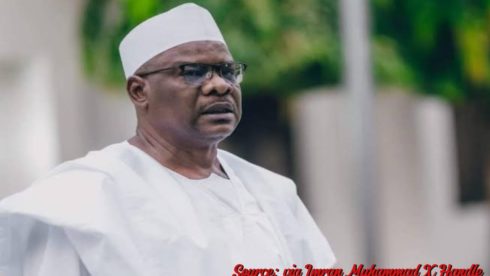Benjamin Kalu, Deputy Speaker of Nigeria’s House of Representatives, has underscored the ECOWAS Parliament’s dedication to employing parliamentary diplomacy in addressing the imminent threats of Mali, Burkina Faso, and Niger’s potential exit from the sub-regional bloc. This strategic move comes in response to mounting concerns about the far-reaching consequences these countries’ withdrawal could have on regional stability and economic integration within West Africa.
Benjamin Kalu’s statement highlights the urgency of the situation and the proactive stance taken by the ECOWAS Parliament. By prioritizing diplomatic channels, the Parliament aims to engage with the concerned nations, understand their grievances, and work collaboratively towards solutions that could prevent a fracture in the regional alliance. This approach reflects a recognition of the complexities involved and the need for nuanced, dialogue-driven resolutions.
Benjamin Kalu: Parliamentary Diplomacy: A Tool for Conflict Resolution
The ECOWAS Parliament’s reliance on parliamentary diplomacy underscores the critical role of dialogue and negotiation in resolving conflicts and addressing member states’ concerns. This approach involves leveraging the unique position of parliamentarians as representatives of their constituents to foster understanding and build consensus across national boundaries. By engaging in constructive discussions and promoting a spirit of cooperation, the Parliament aims to address the grievances of Mali, Burkina Faso, and Niger while working towards mutually beneficial solutions that enhance regional cohesion and stability.
This diplomatic strategy extends beyond traditional government-to-government interactions, allowing for more flexible and inclusive discussions. It provides a platform for diverse voices to be heard, potentially uncovering common ground that might be overlooked in more formal diplomatic settings. The success of this approach could set a precedent for conflict resolution within ECOWAS and other regional bodies facing similar challenges.
Benjamin Kalu: Threats to Regional Stability: The Exit of Mali, Burkina Faso, and Niger
The potential departure of Mali, Burkina Faso, and Niger from ECOWAS presents significant threats to regional stability and economic integration. These countries’ withdrawal could undermine years of progress towards regional cooperation, potentially compromising the security of neighboring states and disrupting established economic ties. The geographical position of these nations, forming a contiguous bloc in the Sahel region, adds to the strategic importance of their continued membership in ECOWAS.
The ECOWAS Parliament’s efforts to address these concerns are crucial in preventing a potentially catastrophic outcome for the region. A fragmentation of ECOWAS could weaken its collective bargaining power on the global stage, reduce its effectiveness in addressing transnational challenges such as terrorism and climate change, and potentially trigger a domino effect leading to further disintegration of the bloc.
Benjamin Kalu: Regional Implications: Economic and Security Consequences
The exit of Mali, Burkina Faso, and Niger from ECOWAS would have far-reaching economic and security implications for the entire West African region. Economically, it could lead to the disruption of established trade routes, the potential loss of investments, and challenges to the implementation of regional economic policies such as the ECO currency project. These disruptions could significantly impact the livelihoods of millions across West Africa, potentially exacerbating poverty and economic instability.
From a security perspective, the withdrawal of these nations could compromise regional security mechanisms, potentially creating gaps in intelligence sharing and joint operations against transnational threats. This could have severe consequences for efforts to combat terrorism, organized crime, and other security challenges that require coordinated regional responses. The ECOWAS Parliament’s diplomatic efforts are thus essential in mitigating these risks and promoting a more stable and prosperous region.
Benjamin Kalu: Diplomatic Efforts: A Collaborative Approach
The ECOWAS Parliament’s diplomatic initiatives to address the concerns of Mali, Burkina Faso, and Niger are characterized by a collaborative approach, involving various stakeholders and regional actors. This inclusive strategy aims to bring together not only government representatives but also civil society organizations, business leaders, and other influential figures who can contribute to finding comprehensive solutions.
By working together and considering diverse perspectives, the Parliament aims to develop solutions that cater to the needs and interests of all parties involved, promoting a more inclusive and equitable regional order. This approach recognizes that sustainable solutions must address the root causes of dissatisfaction among member states while reinforcing the benefits of regional integration and cooperation.
Benjamin Kalu: Achieving Regional Cohesion: The Role of Parliamentary Diplomacy
The success of the ECOWAS Parliament’s diplomatic efforts will be crucial in achieving regional cohesion and preventing the exit of Mali, Burkina Faso, and Niger from the sub-regional bloc. By leveraging parliamentary diplomacy, the Parliament can promote a culture of dialogue, understanding, and cooperation that extends beyond immediate crises to build long-term regional stability and prosperity.
The outcomes of these efforts will likely have implications beyond the immediate situation, potentially setting new standards for conflict resolution and regional cooperation in Africa. If successful, the ECOWAS Parliament’s approach could serve as a model for other regional bodies facing similar challenges, demonstrating the power of inclusive, dialogue-driven diplomacy in addressing complex geopolitical issues and strengthening regional integration.
Table of Contents
Discover more from OGM News NG
Subscribe to get the latest posts sent to your email.













